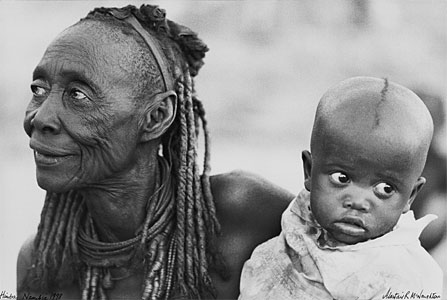a+b) Grandmother GM1 retrieves her granddaughter GD1 then lets her suckle:
c) GMI then grooms her returning daughter who reunites with her own infant
From
BBC Earth News
By Matt Walker
Two grandmother monkeys have been seen intervening to raise their own grandchildren, providing essential care including suckling the young.The scientists who witnessed the behaviour say it is the first unambiguous example of such behaviour shown by a non-human primate.The observations were made in a free-ranging group of Japanese macaques living in Katsuyama, Japan. Details of the grandmothers' actions are published in the journal
Primates.
The same group of wild, free-ranging Japanese macaques ( Macaca fuscata ) have been studied since 1958, so scientists have kept a record of the birth date and blood relationships of each individual. One scientist, Dr Masayuki Nakamichi at Osaka University in Japan, has been studying the animals' social interactions for 30 years.
However, the behaviour of two macaque grandmothers surprised even him.
"We know that some monkeys... sometimes adopt infants. In most cases, it is females who have lost their own infants," Dr Nakamichi says. "However, in the present cases, the old, probably post-reproductive mothers started to take care of their young granddaughters. "It is very unusual for females who have not had their own young offspring for years to start to take care of other infants."
Dr Nakamichi and colleagues at Osaka University first observed a monkey known to them as GM1, a 24-year-old female macaque, looking after her granddaughter GD1.The infant GD1 was the offspring of GM1's own daughter, known as M1.GM1 started looking after GD1 just 20 days after her birth. And she intervened even more when the infant's mother M1 unexpectedly went missing from the troop. Then the grandmother held, groomed, carried and retrieved the abandoned and now two-month-old infant, even placing her nipples in the infant's mouth. The grandmother looked after her granddaughter in this way for at least six days, before the mother returned and gradually resumed her role.
The second case involved a 23-year-old monkey dubbed GM2, who looked after her 14-month old granddaughter, GD2. In this case, the mother, M2, was busy nursing a second, younger infant. So the grandmother stepped in, allowing her granddaughter to take her nipple on numerous occasions. She was observed still looking after her granddaughter in this way 5 months later.
In both examples, the researchers believe the grandmothers were providing essential care. Without the intervention of GM1, the scientists say her granddaughter would have died within two weeks. Because GM1 had not had offspring for six years, she would not have been able to provide milk for the infant, but her actions would have protected her and kept her warm. The second grandmother, GM2, did likely provide her granddaughter with nutritious milk, as the infant was seen actively suckling. It is likely that the repeated suckling by the granddaughter over a few weeks induced her to begin producing milk again.
The behaviour of the two elder monkeys offers support to an idea called the 'grandmother hypothesis'. "It is an idea that post-reproductive grandmothers can play an important role in the survival of their grandchildren, although they cannot produce their own offspring," explains Dr Nakamichi. By doing so, he says, females can improve the chances that their own genes will be passed on down the generations.
The idea helps explain why mammals such as monkeys can live well beyond reproductive age, as by doing so, they can continue to promote the survival of their relations.
However, definitive evidence for the hypothesis has been difficult to obtain. Numerous studies have shown that monkeys such as vervets, Japanese macaques and langurs will form close relationships with their grandchildren, investing time in them and occasionally helping to protect them. Yet other studies on Japanese macaques, baboons and titi monkeys, for example, do not show that the presence of grandparents improves an infant's survival.
In other social mammals such as elephants, grandmothers may also occasionally help out with grandchildren. But usually the grandmother has more offspring of her own, and does not provide essential, life-saving care.
"To our knowledge, there have been no reported cases in which, instead of a mother, a grandmother without dependant offspring has continuously provided essential care for the survival of her dependant grandchild, which is in accordance with the grandmother hypothesis," Dr Nakamichi and colleagues write in the journal Primates.
Story from BBC NEWS:
http://news.bbc.co.uk/go/pr/fr/-/earth/hi/earth_news/newsid_8370000/8370743.stm
Citation:
Nakamichi M, Onishi K, Yamada K (2009) Old grandmothers provide essential care to their young granddaughters in a free-ranging group of Japanese monkeys (Macaca fuscata). Primates DOI 10.1007/s10329-009-0177-7








